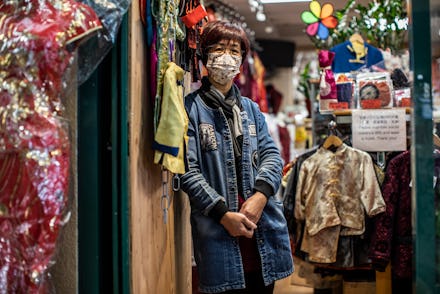7 ways to effectively fight anti-Asian racism now

Anti-Asian violence has been on the rise in recent weeks. Vicha Ratanapakdee, an 84-year-old Thai man, died of injuries sustained after a teenager brutally pushed him on January 30. On February 3, an assailant slashed 61-year-old Filipinx man Noel Quintana on a New York subway. Attackers also assaulted and robbed a 64-year-old Asian woman in San Jose that day. Oakland Chinatown has seen a wave of violence, including an attack on a 91-year-old man.
All of this is part of a larger trend of anti-Asian racism related to the coronavirus, thanks in no small part to our former president’s rhetoric. Stop AAPI Hate, an organization recording anti-Asian racism during the pandemic, received 2,808 firsthand accounts of such incidents from March 19 to December 31, 2020. These come at a time when COVID is already taking other outsized tolls on our communities in the form of long-term unemployment and heightened risk to frontline healthcare workers.
The Asian American community needs your support. Here’s how to stand with us during this difficult time, whether you're Asian American yourself or an advocate.
Engage with local organizers
As tempting as it might be to take cues from celebrities, organizers who have been working for years in communities where these attacks have occurred have a far more intimate understanding of what the survivors and other affected individuals need to stay safe.
If you live in the San Francisco Bay Area, for instance, read the joint statement released by dozens Asian American organizations across the region, or listen to their press event. Their demands include resources to support those harmed by violence, address long-term systemic issues that make violence more likely, and build solidarity with other BIPOC groups. They’re calling not for greater involvement of a law enforcement system that disproportionately targets Black Americans, but community-based solutions that keep everyone safe.
Emphasize solidarity
Remember that division among BIPOC communities allows the white supremacy that breeds anti-Asian violence to thrive. The only way we can dismantle white supremacy is through building solidarity with each other.
Familiarize yourself with the long history of solidarity between the Black and Asian communities by learning about Yuri Kochiyama, Kartar Dhillon, and other Asian American organizers who worked with Black Americans toward our collective liberation. Read about the Black American soldiers who deserted their regiments to fight for Filipinx independence, and listen to Martin Luther King, Jr.’s sharp criticism of the Vietnam War in his famed 1967 speech. Peruse HipHopForChange’s Instagram post on Black and Asian solidarity.
Join solidarity groups, like Asians4Black Lives. Volunteer with a local community-based organization — many already engage in solidarity across BIPOC communities.
Learn about the history of anti-Asian racism
It’s important to understand current anti-Asian violence as part of a long history of the U.S. scapegoating Asian Americans, which stretches back to the Yellow Peril, or the view of Asia as a threat to Western values. Learn how this country codified anti-Asian racism into law — Executive Order 9066, which authorized the incarceration of individuals of Japanese descent in internment camps during World War II, is just one example. Read about the Watsonville Riots, in which white mobs attacked Filipinx farm workers in 1930 after seeing them dance with white women, and the Bellingham Riots, in which white mobs (notice a pattern?) tried to scare South Asian migrant workers out of Bellingham, Washington in 1907.
Importantly, read about the model minority myth, or the belief that Asian Americans are more successful than BIPOC because we work hard and do as we’re told, and its use as a wedge between us and other communities of color. Also, remember that Asian Americans are not a monolith: We’re not all East Asian, and we're not all of the successful, Crazy Rich variety.
Donate to support Asian American seniors
A number of fundraising campaigns have emerged to support our elders. A group of 22 Asian American-owned businesses in New York City are raising money to fund free meals for Asian American seniors, as well as underserved homeless shelters in Black and Latinx communities. Any funds raised beyond their $25,000 goal will go toward charities for Asian Americans in need.
Asian Americans for Equality is raising money for its Small Business Emergency Relief Fund for New York City Chinatowns. You can also donate to the many organizations serving Asian American communities, such as the Asian Pacific Environmental Network, the Asian Prisoner Support Committee, Filipino Advocates for Justice, the Progressive Vietnamese American Organization, and the Chinese-American Planning Council.
Report anti-Asian racism
Submit a description of any anti-Asian racism you witness through Stop AAPI Hate’s website. The data collected can inform resources for those impacted, rapid response and preventative measures, community-based safety efforts, and policymaking.
Sign up for bystander intervention training
It’s not enough to report racism, though — you need to speak up, too, and the incident doesn’t need to be physically violent to warrant your voice. For guidance on how to respond in these situations, Hollaback! has teamed up with Asian Americans Advancing Justice to host free trainings on how to intervene when you witness anti-Asian racism. You can sign up for the next training, scheduled for March 15, here.
Sign up for community-based safety initiatives
As I wrote in a previous article for Mic, efforts to keep Asian American seniors safe shouldn’t come at the expense of Black Americans or other people of color. Community-based safety measures don’t involve a white supremacist policing system — instead, community members decide what safety looks like, based on their unique needs.
Oakland Chinatown, for instance, has started the Chinatown Ambassador Program, focused on relationships with business owners and clean-up efforts that make the neighborhood look more vibrant. You can sign up to volunteer here. You can also contact IG user Amy Lee, who wants to start a grocery shopping buddy program for seniors in San Francisco Chinatown. Do some homework to figure out if similar initiatives exist where you live.